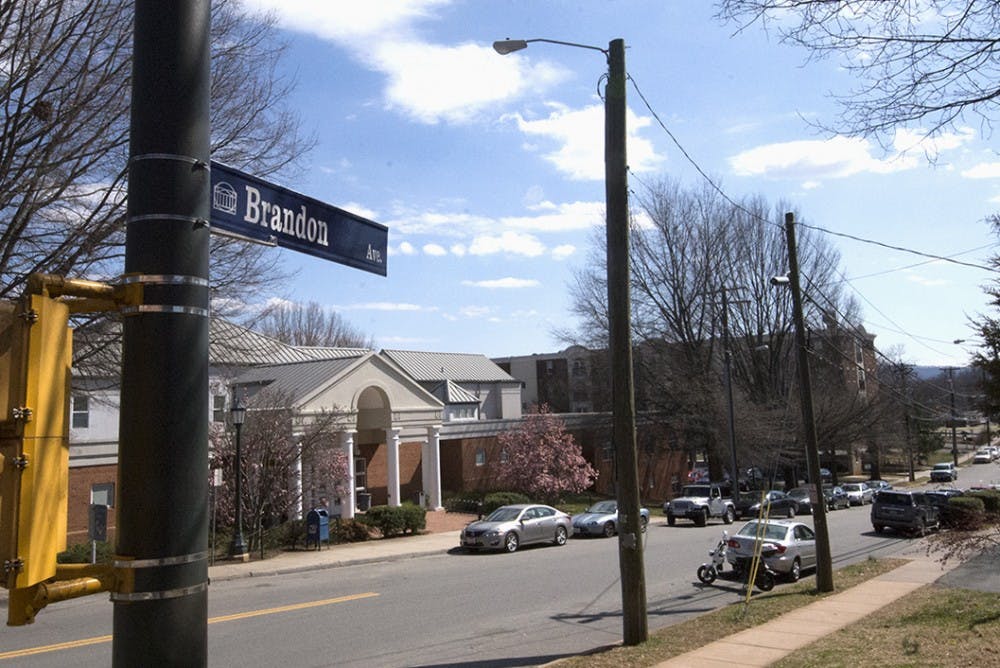As part of the 2008 Grounds Plan, the University identified Brandon Avenue as an opportunity to further the commitment “to offer superior environments for future learning and research endeavors.” The Brandon Avenue Master Plan, developed by the Office of the Architect in November 2016, plans to transform the area into “a vibrant, mixed-use, sustainable district that links the Health System to Central Grounds.” Included in the renovations is an updated Student Health Center, new student housing and green spaces. Redeveloping the area is an important step in the process of unifying distinct areas of Grounds — the increased pedestrian and green spaces will help members of the University community see the Health System and Central Grounds as a single entity.
To fully realize this unification, the University has requested that the City of Charlottesville transfer ownership of Brandon Avenue. Although the City could retain full title to the property while the plan continues, considering the master plan includes redevelopment of the street itself, the transformation would be much smoother if the University owned the land.
The Charlottesville City Council seems open to the transfer, but Mayor Nikuyah Walker has requested a valuation of the property’s worth to see if it would make financial sense to have the University purchase the property, as opposed to having the city gift it. At face value, such a purchase may seem reasonable because of the land’s value to the City as an asset. When factors are taken into account such as Brandon Avenue’s operation costs and the benefits the City would receive as a result of the redevelopment, it becomes clear selling the land is an unnecessary burden on the University. Council should instead transfer the property in light of the redevelopment plan’s financial and communal benefits to Charlottesville.
Transferring ownership of the area to the University would lift a budgetary restriction from the City, freeing the Council to better pursue its mission of providing services that promote equity and an excellent quality of life in Charlottesville. Currently, the City pays for maintenance of the street, which typically includes crack sealing and asphalt paving. The City also has to maintain the underground utilities in the area, such as gas lines and electricity, to ensure the area has access to necessary resources. Upon transfer, the City would no longer have to concern itself with street maintenance, and instead the University would be financially responsible for the upkeep.
In a recent Council meeting, Walker bolstered her case for selling the property by providing an analogy to the City of Houston, where the city sold streets and utility easements to a Valero refinery for $2 million. The oil company already owned much of the land surrounding the streets, similar to the University’s ownership of many of the buildings around Brandon Avenue, and the transfer allowed Valero to build a new warehouse and security building. In Walker’s eyes, a similar transfer could take place in Charlottesville, whereby the University would benefit from ownership and the City would generate increased revenue.
The analogy, however, falls apart when the University’s current contributions to the City are taken into account. According to City Manager Maurice Jones, the University has made a commitment to provide assistance in the West Main Streetscape project, a $31 million redesign currently underway. In addition, the University is the top employer in the Charlottesville area, providing income and stability to many members of the community.
When combined with benefits of the Brandon Avenue revitalization, such as increased on-Grounds housing, which takes students out of the local housing market and makes housing more accessible to local residents, the University’s contribution to the City is clear. Walker’s analogy to Houston may hold water in that the transfer should somehow benefit the City; however, forcing a purchase instead of gifting the land would ignore the University’s existing and future contributions to the community. The City should gift the property to the University in light of its contributions to the City, financial and otherwise.





